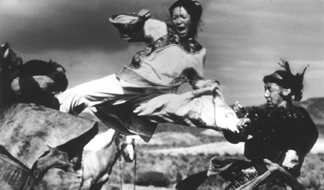Blockbuster Ballet
Ang Lee's martial arts masterpiece is as fast as lightning. Ha!
By Ellison Walcott

I’ve got your Green Destiny right here, baby.
Martial arts movies have long attracted a cult following, usually reserved for art houses or old theaters with sticky floors. No longer. Crouching Tiger, Hidden Dragon Director Ang Lee's new blockbuster ballet breaks the divide and upgrades the ritualistic Hong Kong action movie into a spectacular touching all genres.
Though Lee exceeds all the physical and spiritual expectations normally found in this type of picture, countless predecessors (Bruce Lee, Jackie Chan, John Woo and others) have whetted western appetites for the rich texture of the eastern action tale. But Lee's Crouching Tiger works superbly in and outside the martial arts tradition. In this film, the fight scenes are not the focal point around which the narrative unfurls. Instead, the action scenes enhance an already well-developed yarn. Romance, intrigue, folly and a few good old fashioned free-for-alls will leave genre newcomers squealing with glee.
Many believe the martial arts genre is a stretch for the director of The Ice Storm, Sense and Sensibility and Eat Drink Man Woman. His classic focus on the human relationship is what, in part, gives this longtime movie staple a new indispensable glow.
The great warrior Li Mu Bai (Chow Yun-Fat) has decided to give his sword, The Green Destiny, to a governor and longtime friend and renounce avenging his master's death. He has chosen to at last follow his heart and be with Yu Shu Lien (Michelle Yeoh), the "Bat Girl" of this eastern tale. But as is the providence of all warrior heroes, he is drawn back into the fray when The Green Destiny is stolen, and Jade Fox (Cheng Pei Pei), the slayer of his master emerges.
Martial arts films are customarily male-dominated with women playing minor roles. In an extraordinary gamble Lee places women at the helm. In Crouching Tiger, Jen Yu (Zhang Ziyi), the daughter of the aforementioned governor, is the red thread that catalyzes all that conspires. When Yu Shu Lien comes to visit the governor, the young Jen Yu is in awe. She hangs on Yu's every word. She is about to be married, but yearns for the lifestyle of the free-spirited warrior. All want her as their disciple. Thus, the world is indeed her oyster as every encounter is magical and everyone is drawn in by her mystery as well as her mastery.
Jade Fox is Jen Yu's antithesis. As the foe, she is the wall between the other characters and their fantasies. Her involvement with Jen Yu creates both a disdain and sympathy.
Lee cleverly imports the deep fragility of relationships and boundaries and reveals that heroes are not just gun-toting, laser-slinging, ballistic missile-launching bandits; instead, they are ethereal, graceful and honor bound. Though they may wield a sword, their true weapons are their bodies and minds that transcend the normal limitations of gravity and space. Perhaps the American cousin to this eastern sensibility, however far removed, is the buddy movie (Shanghai Noon, Rush Hour and 48 Hours) where the two pals bond through a tussle. However, comic relief and mutual respect is the ultimate purpose from both sides of the world.
The fight scenes in Crouching Tiger are delicately choreographed. Opponents tango, jitterbug and pas de beret. Both beauty and folly play a role in these scenes created by Yuen Wo-Ping. Yuen Wo-Ping, known to some as "the master action-choreographer," is the man behind Jackie Chan's finely tuned skills and who also gave The Matrix its stylish mind boggling battles. He keenly recognizes the humor in human nature and creates discord that demonstrates his great sense of comedic timing. In a scene between two soon-to-be lovers, a willful young woman chases a young bandit across the desert in retrieval of her comb. As they charge through the wind and sand, their fighting is as ingenuous as Charlie Chaplin slapstick, with all the antics of circus clowns and all the grace of Diaghilev.
It is Yuen's wire work that gives the warriors their superhuman powers. (Miraculously, the scenes were staged with wires and pulleys, and are not the result of special effects.) They float upward as easily as a helium balloon and are able to leap more than just tall buildings at a single bound. A sword fight between Chow Yun-Fat and Zhang Ziyi is set 80 feet up in a bamboo tree. They are like birds as they fly from treetop to treetop. Here the air is more akin to water, and the sense of their weightlessness is the stuff of which dreams are made.
The Chinese backdrops for Crouching Tiger are spectacular and dramatic. Horses madly charge across the Gobi Desert. Moonlit temple rooftops are the playground for nighttime tomfoolery. Lovers converse on cloud-covered mountain ranges. No action or inaction in this film is unwarranted. The pauses and blocking of blows are just as telling as the swift kicks and punches. The plot deepens through each confrontation. Ang Lee has fashioned a vastly entertaining action film. In line with the spirit of Crouching Tiger, Hidden Dragon, convention goes by the wayside to create new folklore beyond the wildest of dreams.